Driving Growth: Your Essential Guide to Local SEO
- Home
- Driving Growth: Your Essential Guide to Local SEO
Imagine walking down a bustling street in your city, craving some good old fish and chips. You whip out your phone and type "best fish and chips near me". Google springs into action, serving you a list of local businesses matching your hunger pangs. This is the magic of local SEO.
This isn't just about finding comfort food on a whim though - it's about how small businesses get found by potential customers like yourself.
My journey with local SEO began when I decided to help my photography business gain visibility online. We were competing against big chains with bigger budgets – but guess what? With the right strategies, we managed to carve out our own space on that coveted first page of search results.
By the end of this guide, you'll know how to make Google My Business work harder for your visibility. You'll also discover strategies and local SEO tips to fine-tune your website content and get it noticed.
Table Of Contents:
- Understanding Local SEO
- Building a Strong Online Presence with Google My Business
- On-Page Optimization Techniques for Local SEO
- Off-Page Optimization Tactics for Effective Local SEO
- Performing a Comprehensive Local SEO Audit
- Advanced Strategies for Improving Local SEO Performance
- Real-Life Success Stories in Local SEO
- Recommended Tools for Effective Local SEO
- FAQs About Local Seo
- Conclusion
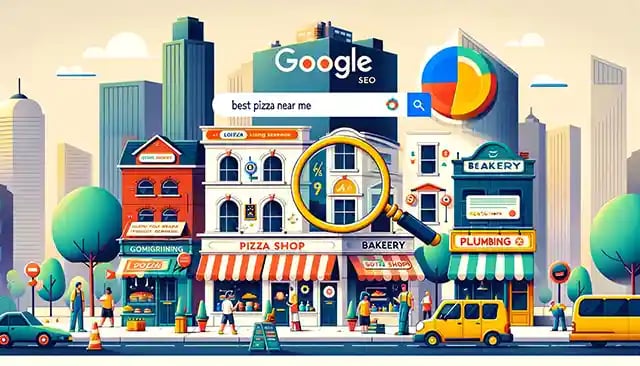
Understanding Local SEO
If you've ever wondered, "What is local SEO?" let's start by saying it’s the key to visibility for your UK business in this digital age. Local search marketing helps people find services close to them - everything from restaurants to plumbers. Imagine being a pizza shop owner and showing up on top when someone nearby searches for 'best pizza near me'. That's the power of local SEO.
Now here comes an eye-opener: 46% of all Google searches are looking for local information. Yes, almost half. So if you're not optimized for these local queries, you're potentially missing out on a lot of traffic.
The Importance of Local SEO For UK Businesses
To emphasize how crucial it is - consider this scenario: Two businesses offer similar products at competitive prices. But one has an active online presence with strong search rankings while the other doesn't show up in any online search results. Guess who'll gain the most patronage? Exactly.
This underlines why understanding and implementing effective strategies related to your website’s ‘local SEO’ plays such a pivotal role today. Creating quality content that includes relevant keywords like 'UK', 'Local Business' or even your specific city name can make sure potential customers see YOU first.
How Does Local Search Work?
A common question asked is “How does Google decide what information to display?” When users perform searches involving locations (like searching ‘bakery London’, or simply using phrases like ‘near me’), Google gives preference to businesses located in that area who have established their authority through various ranking factors such as proximity, relevance and prominence.
In simple terms, if two bakeries are equal in all aspects but one is closer to the searcher, Google will likely show that one first. Similarly, if a bakery has many positive reviews and a well-optimized business profile (remember those local keywords?), it’s going to rank higher.
Google's Local Search Ranking Factors
the placement of a website on the search results page. Ranking factors include things like site speed, mobile-friendliness, and content quality. Each plays a significant role in where your website lands on Google's search result pages.
Local SEO is the golden ticket to getting your UK business seen online. It puts you on top of local searches, driving more traffic your way. If you're not optimized for it, you might be missing out big time. By creating quality content with relevant keywords and maintaining a well-optimized profile, Google will likely favor your business in search results.
.webp?width=640&height=366&name=Building%20a%20strong%20online%20presence%20with%20Google%20My%20Business%20(GMB).webp)
Building a Strong Online Presence with Google My Business
Your business needs an online presence, but where do you start? The answer is simple - Google My Business. This platform lets local businesses create and optimize their profiles, making it easier for potential customers to find them in the vast world of search engines.
Google My Business, or GMB as we'll call it hereafter, is the creme de la creme of local search. Optimizing your GMB profile can be an effective way to drive more visitors to your website and draw in customers to your physical store.
Leveraging Google Maps for Better Visibility
You've probably used Google Maps at least once before – perhaps when you were lost in a new city or trying to find the fastest route home. But did you know that this handy tool could also be leveraged for better visibility on local searches?
Listing your business on Google Maps isn't just about showing people how they can physically reach you; it's about being found by those who are searching for what you offer. Optimizing this feature can significantly boost your business' exposure within its service area.
Crafting Your Local SEO Strategy: It’s All About Details
The key elements involved in creating and optimizing an effective GMB listing include providing complete information (name, address phone number), managing reviews regularly and posting fresh content such as photos or updates related to offers from time to time.
- Name: Make sure the name matches exactly with how it appears across all other platforms – consistency is king.
- Address Phone Number: Ensure the address and phone number are correct, complete, and also consistent with other listings.
- Reviews: Respond to reviews - both positive and negative. This not only shows you value customer feedback but can also help resolve any issues that may arise.
A well-managed GMB profile acts as a key component of your online presence. It's the first impression for many potential customers, making it crucial to keep it up-to-date and engaging.
Boost Your Business with Google My Business: Kick things off by creating a well-optimized profile on Google My Business. This will let you pop up in local searches and pull more customers your way. Don't forget to use Google Maps for better visibility too. And remember, an effective local SEO strategy is key - it's all about nailing down the details like name consistency, accurate contact info, and being responsive.

On-Page Optimization Techniques for Local SEO
If you're looking to make a splash in local search, your on-page SEO game needs to be spot-on. Let's explore some key strategies that can help.
Creating Localized Content
To get the attention of locals, it helps to speak their language - and we don't just mean English. You need content that resonates with the community around you. That might include references to regional landmarks or events, or information tailored specifically towards residents' needs.
This is where keyword research for local searches comes into play. Understanding what your intended viewers are searching for enables you to produce material that responds to their inquiries and resolves their difficulties.
Optimizing Meta Tags and Headers
You've got engaging localized content - great. But without proper meta tags and headers, all those lovely words might go unnoticed by search engines like Google. So let's fix this issue right away.
Your page title (or title tag) should reflect the page’s contents while incorporating target keywords relevant to your business location – but remember not to make it too long.
- The URL also matters; including essential keywords related directly or indirectly to "local" aspects can significantly enhance visibility in SERPs.
Structured Data Markup for Local Businesses
In terms of giving yourself an edge over competitors, few techniques are as potent as structured data markup – particularly when aiming at enhancing your presence in local search results pages.
- This nifty bit of HTML lets search engines understand more about who you are and what do - from services offered through hours of operation up until phone number availability. And since Google loves websites that simplify its job, this can significantly boost your visibility.
Designing Mobile-Friendly Websites
The importance of mobile-friendly design in the context of local SEO cannot be overstated. With a whopping 61% of all Google searches performed on mobile devices, not having a responsive website is like leaving money on the table.
Perfect your on-page SEO for local search by creating content that resonates with the local community, optimizing meta tags and headers to please search engines, using structured data markup to stand out from competitors, and designing a mobile-friendly website. Remember, being locally relevant is key.
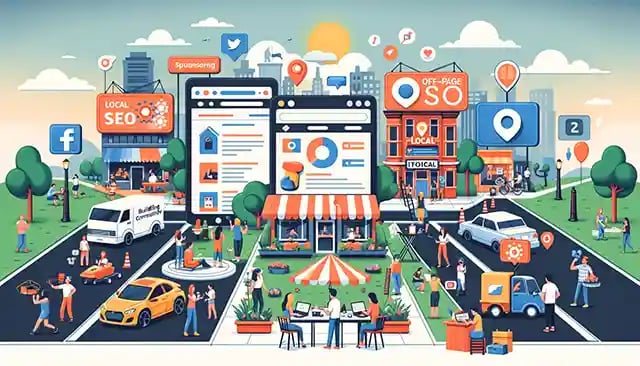
Off-Page Optimization Tactics for Effective Local SEO
You've got your local business up and running, but how do you make sure potential customers find you? Off-page optimization is the answer. In this local SEO strategy guide, you will learn that it's all about building high-quality inbound links, leveraging social media, engaging with the local community, and using the right SEO tools.
Building High-Quality Inbound Links
Inbound links are like votes of confidence from other websites; they tell search engines that your site has valuable content. But not all links are created equal - quality matters more than quantity.
To get these precious backlinks, start by creating shareable content on topics relevant to your audience. If it's good enough (think comprehensive guides or in-depth tutorials), other sites will naturally link to it as a resource.
Another tactic is guest blogging where you write an article for another website in exchange for a link back to yours. Remember though – choose only reputable websites related to your industry.
Leveraging Social Media for Local SEO
Social media isn't just about cute cat videos; it can be a powerful tool in your local SEO arsenal too. While Google doesn't use social signals directly in its ranking algorithm, there’s no denying their indirect influence on rankings through brand awareness and traffic generation.
Maintaining active profiles across platforms like Facebook or Instagram lets you engage with customers and drive them towards actions beneficial to both parties such as leaving reviews or visiting specific pages on your site.
Engaging With The Local Community
A big part of off-page optimization lies outside cyberspace – literally within the physical boundaries of our neighbourhoods.
Engaging with the local community can involve sponsoring a charity event, hosting meetups or simply attending gatherings related to your industry. Such activities create opportunities for press coverage and naturally generate high-quality inbound links.
Using Local SEO Tools
From keyword research tools like Moz Local to review monitoring, having the right gear can simplify your local SEO efforts. It's a bit like using the best wrench in your toolbox - it just makes everything flow more smoothly.
Don't underestimate the value of engaging with your local community offline. This can lead to increased press coverage and a higher number of quality backlinks. Equally important is having the right tools at hand, like Moz Local, which can simplify all these tasks significantly. So remember: for an effective local SEO strategy, create shareable content, leverage guest blogging opportunities and use social media platforms wisely to boost brand awareness as well as traffic.
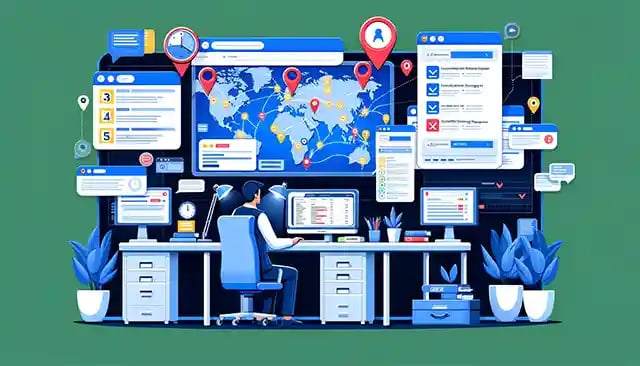
Performing a Comprehensive Local SEO Audit
Your local search engine optimization efforts will only be as successful as the groundwork that is laid. This means conducting a comprehensive local SEO audit. But how do you get started? To start your local SEO audit, here are some helpful steps.
Staying Updated with Algorithm Changes
To kick things off, let's discuss Google and its ever-changing algorithms. It loves change - especially when it comes to its algorithms. Staying updated with these changes can be daunting but doing so will give your business an edge in the search rankings.
The impact of algorithm changes becomes clear when we consider that map pack results can vary based on the searcher’s location. That means even if your business ranks well downtown, you might not show up for potential customers searching from the outskirts of town.
This reality makes tracking local search rankings essential in any effective local SEO strategy. If keeping track of every algorithm change seems overwhelming, don't worry. There are tools and resources available that monitor these updates and break down what they mean for businesses like yours.
Audit Your Online Presence
An important step in conducting an audit involves examining your online presence comprehensively. This process should involve checking how consistent your name, address phone number (NAP) information appears across different platforms.
If inconsistencies exist – say between Yelp and Facebook or within Google My Business itself - this could hurt both visibility and credibility among potential customers performing people searches locally.
Citation Audit: The Heartbeat of Local Search Ranking Factors
The Hoth's Citation Tool, a local SEO tool, can help you conduct a citation audit. This helps ensure your business listings are accurate and consistent across the web. Citations play an important role in how Google considers your website for ranking - they're like the heartbeat of local search ranking factors.
Monitor Your Online Reputation
online reputation comes into play. You must stay on top of your game, listening to what customers say and responding appropriately. After all, a stellar online presence can be the key to unlocking incredible growth for your business.
Begin your local SEO campaign with a comprehensive audit. Stay informed about Google's algorithm changes to maintain a competitive edge and utilize tools that track these updates. Consistency in name, address, and phone number (NAP) across various platforms is crucial for your online presence. Leverage resources such as The Hoth's Citation Tool for this purpose.
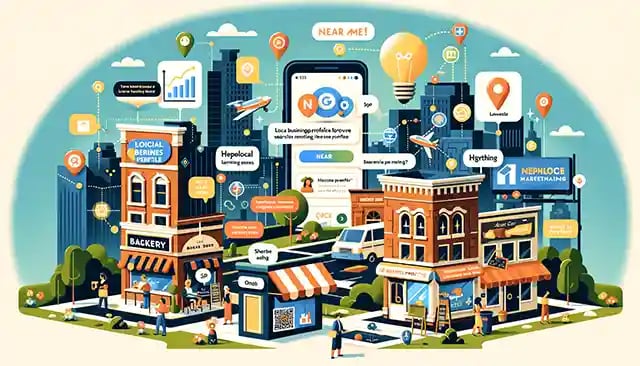
Advanced Strategies for Improving Local SEO Performance
The world of local SEO is a battlefield, and your business needs to be armed with advanced strategies. Let's dive deeper into how you can optimize for "near me" searches, target local service providers, implement hyperlocal tactics, and integrate offline marketing.
Optimizing for 'Near Me' Searches
"Near me" has become the magic phrase in mobile search queries. Google states that "near me" searches have seen a dramatic boost of 250% since 2017. So how do we harness this power? It starts with ensuring your business address and phone number are consistently listed across all platforms – think Google Business Profile, Moz Local and other local listings. This consistency gives search engines confidence in displaying your location when people search locally.
Implementing Hyperlocal Tactics
You may ask what could be more local than 'Local SEO'? Welcome to the concept of hyperlocal. Targeting not just cities but neighbourhoods or even streets within them allows businesses to reach potential customers who might be around the corner. Remember that rankings can differ significantly depending on geographical locations - they tend to get better as one moves from downtown towards the outskirts (Local Falcon).
Targeting Local Service Providers
In any community there exist synergies between different service providers; and collaborations waiting to happen. For example, a bakery could partner up with nearby coffee shops offering discounts or special packages enhancing their appeal while boosting each other's visibility online. Such partnerships are a great idea for improving your local SEO strategy.
Integrating Offline Marketing
Local SEO is not just about online activities. Your offline marketing strategies can play an essential role in boosting your online presence, too. Think QR codes on flyers leading to Google Posts or special offers listed on social media channels that customers have seen first-hand at the physical location of the business (Local Viking).
Utilizing PPC Advertising for Greater Reach
With PPC ads, you can start seeing instant results while also working on boosting your organic search rankings. So if quick outcomes are what you're after, Pay-Per-Click advertising could be just the ticket.
Rev up your local SEO by focusing on 'near me' searches, working with other local businesses, using hyperlocal tactics and integrating offline marketing. Don't forget the power of PPC advertising for quick wins. Be consistent in listing your business info across platforms to give search engines confidence.
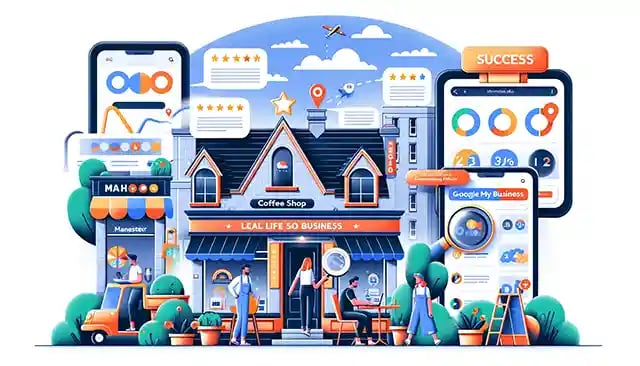
Real-Life Success Stories in Local SEO
When it comes to local SEO, seeing is believing. Let's look at some real-life success stories from UK businesses that have nailed their local search strategies and see if we can learn local tips from their experience.
A Small Business Climbs the Google Ladder
The owner of a small coffee shop in London was struggling with online visibility. Despite having an amazing location and loyal customers, when people searched for a 'coffee shop near me', they were nowhere to be found on Google. So they decided to revamp their local SEO strategy.
To start, they updated their Google My Business profile, making sure all information was accurate including address and phone number. They also began actively responding to reviews which signaled engagement to both potential customers and search engines alike.
This wasn't enough though; the coffee shop needed more backlinks - especially locally relevant ones. They reached out within the community and managed a collaboration with a popular lifestyle blogger who was creating local content and gave them an inbound link as well as exposure through social media channels.
A Service Provider Targets Local Searches
Moving onto our next story: A plumbing service provider operating around Manchester had always relied on traditional word-of-mouth referrals but wanted more business online from targeted local searches like 'plumber near me' or 'emergency plumber Manchester'. The challenge here is to optimize online pages for specific service area queries rather than general terms.
An intensive audit revealed opportunities such as enhancing mobile-friendly design due to increasing mobile searches for services like theirs, leveraging structured data markup (particularly important because Google considers this heavily), engaging with customer reviews effectively, and building strong relationships with other businesses leading not just offers of help but also to invaluable local citations to attract a local audience.
A Local Retailer Leverages Social Media
Lastly, let's discuss a clothing retailer based in Liverpool who wanted more footfall from people searching in the local area. They realized that while they had an optimized online store, their social media presence was lacklustre and uncoordinated with their SEO efforts.
They tackled the problem head-on, giving their entire system a much-needed overhaul.
their local SEO strategy. By refining their Google My Business profile, earning local backlinks, implementing a mobile-friendly design and structured data markup, as well as forging strong business relationships - they managed to gain impressive online leads. All these efforts were further amplified when they synced it with their social media strategies which ultimately led to an increase in footfall from local searches.
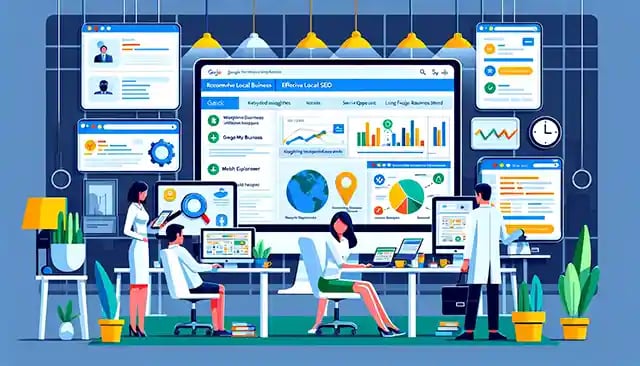
Recommended Tools for Effective Local SEO
If you want to up your local search engine rankings, having the correct instruments in your toolkit is an excellent plan. The world of Local SEO can be complex, but with these top-notch tools on your side, it becomes easier to navigate and dominate.
Google My Business (GMB)
The crème de la crème of local search, Google My Business helps you manage how your business information appears across Google services like Search and Maps. It lets potential customers see crucial details such as address, phone number, opening hours, reviews and more at a glance.
To make sure that all this valuable data remains accurate and updated over time consider using an automated tool for listing management like Moz Local. This tool syncs with numerous directories ensuring consistent information across the web - a significant factor Google considers when determining map pack rankings.
Moz’s Keyword Explorer & SERP Analysis Toolset
Moz's suite of tools are must-have for anyone serious about their local SEO campaign. They offer insights into keywords relevant to your business or service area, including those used by competitors. Plus, they help identify high-value inbound link opportunities – essential ingredients in improving search ranking factors.
Screaming Frog: Your Go-To Website Audit Tool
Screaming Frog's website audit tool takes away the pain from conducting comprehensive site audits - whether it's a mobile-friendliness check or assessing page speed optimization, which affects user experience considerably, especially considering 61% of all Google searches are performed on mobile.
Local Falcon: The Local SEO Visibility Tool
Local Falcon offers a bird's eye view of your local search rankings. This visual tool shows you how your business ranks in different parts of your service area, giving an idea about the effectiveness of local signals and 'near me' search performance – something crucial for businesses looking to dominate their market locally.
Boosting your local search rankings is a breeze with the right tools. Use Google My Business for crucial business details, Moz Local for listing management and keyword insights, Screaming Frog for comprehensive site audits, and Local Falcon to visualize your local search performance.
FAQs About Local Seo
What is the local SEO checklist?
The local SEO checklist includes optimizing your Google Business Profile, building quality inbound links, creating localized content, and managing online reviews. Don't forget regular website audits.
How do I create local SEO content?
Create local SEO content by focusing on keywords relevant to your area. Incorporate these into well-written articles or blog posts that offer value to your audience and demonstrate regional expertise.
What are the best local SEO techniques?
The best techniques for effective Local SEO include leveraging Google My Business, optimizing meta tags and headers, improving page speed, engaging with the community, and using structured data markup.
How effective is local SEO?
Local SEO can be highly effective at driving targeted traffic to businesses. It's crucial for companies looking to attract nearby customers who are ready to buy or seeking services in their vicinity.
Conclusion
Local SEO isn't just about getting your business noticed. It's a strategy that takes you right to the doorstep of potential customers.
This guide armed you with tools and tactics to dominate local search rankings, from optimizing your Google Business Profile to leveraging social media for engagement.
You've learned how inbound links can boost your visibility and why staying updated with algorithm changes is vital. Plus, we explored advanced strategies like "near me" searches and hyperlocal tactics.
This definitive guide has been about aiding local businesses to succeed in a progressively digitalized universe. Now it's time for action - make use of what you’ve learned today!


